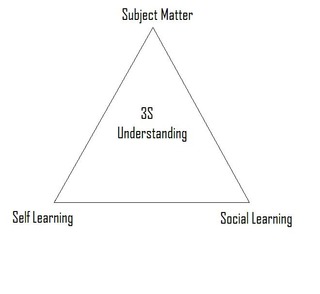Related Research Articles
Progressive education, or educational progressivism, is a pedagogical movement that began in the late 19th century and has persisted in various forms to the present. In Europe, progressive education took the form of the New Education Movement. The term progressive was engaged to distinguish this education from the traditional curricula of the 19th century, which was rooted in classical preparation for the early-industrial university and strongly differentiated by social class. By contrast, progressive education finds its roots in modern, post-industrial experience. Most progressive education programs have these qualities in common:

Learning theory describes how students receive, process, and retain knowledge during learning. Cognitive, emotional, and environmental influences, as well as prior experience, all play a part in how understanding, or a worldview, is acquired or changed and knowledge and skills retained.

Pedagogy, most commonly understood as the approach to teaching, is the theory and practice of learning, and how this process influences, and is influenced by, the social, political, and psychological development of learners. Pedagogy, taken as an academic discipline, is the study of how knowledge and skills are imparted in an educational context, and it considers the interactions that take place during learning. Both the theory and practice of pedagogy vary greatly as they reflect different social, political, and cultural contexts.
Transformative learning, as a theory, says that the process of "perspective transformation" has three dimensions: psychological, convictional, and behavioral.
Transformative learning is the expansion of consciousness through the transformation of basic worldview and specific capacities of the self; transformative learning is facilitated through consciously directed processes such as appreciatively accessing and receiving the symbolic contents of the unconscious and critically analyzing underlying premises.

In education, a curriculum is the totality of student experiences that occur in an educational process. The term often refers specifically to a planned sequence of instruction, or to a view of the student's experiences in terms of the educator's or school's instructional goals. A curriculum may incorporate the planned interaction of pupils with instructional content, materials, resources, and processes for evaluating the attainment of educational objectives. Curricula are split into several categories: the explicit, the implicit, the excluded, and the extracurricular.
A didactic method is a teaching method that follows a consistent scientific approach or educational style to present information to students. The didactic method of instruction is often contrasted with dialectics and the Socratic method; the term can also be used to refer to a specific didactic method, as for instance constructivist didactics.

Synthetic phonics, also known as blended phonics or inductive phonics, is a method of teaching English reading which first teaches letter-sounds and then how to blend (synthesise) these sounds to achieve full pronunciation of whole words.

Democratic education is a type of formal education that is organized democratically, so that students can manage their own learning and participate in the governance of their educational environment. Democratic education is often specifically emancipatory, with the students' voices being equal to the teachers'.
Culturally relevant teaching is instruction that takes into account students' cultural differences. Making education culturally relevant is thought to improve academic achievement, but understandings of the construct have developed over time Key characteristics and principles define the term, and research has allowed for the development and sharing of guidelines and associated teaching practices. Although examples of culturally relevant teaching programs exist, implementing it can be challenging.
Queer pedagogy (QP) is an academic discipline devoted to exploring the intersection between queer theory and critical pedagogy, which are both grounded in Marxist critical theory. It is also noted for challenging the so-called "compulsory cisheterosexual and normative structures, practices, and curricula" that marginalize or oppress non-heterosexual students and teachers.
Curriculum theory (CT) is an academic discipline devoted to examining and shaping educational curricula. There are many interpretations of CT, being as narrow as the dynamics of the learning process of one child in a classroom to the lifelong learning path an individual takes. CT can be approached from the educational, philosophical, psychological and sociological perspectives. James MacDonald states "one central concern of theorists is identifying the fundamental unit of curriculum with which to build conceptual systems. Whether this be rational decisions, action processes, language patterns, or any other potential unit has not been agreed upon by the theorists." Curriculum theory is fundamentally concerned with values, the historical analysis of curriculum, ways of viewing current educational curriculum and policy decisions, and theorizing about the curricula of the future.
Education sciences, also known as education studies, education theory, and traditionally called pedagogy, seek to describe, understand, and prescribe education including education policy. Subfields include comparative education, educational research, instructional theory, curriculum theory and psychology, philosophy, sociology, economics, and history of education. Related are learning theory or cognitive science.
Multicultural education is a set of educational strategies developed to provide students with knowledge about the histories, cultures, and contributions of diverse groups. It draws on insights from multiple fields, including ethnic studies and women studies, and reinterprets content from related academic disciplines. It is a way of teaching that promotes the principles of inclusion, diversity, democracy, skill acquisition, inquiry, critical thought, multiple perspectives, and self-reflection. One study found these strategies to be effective in promoting educational achievements among immigrant students.

Backward design is a method of designing an educational curriculum by setting goals before choosing instructional methods and forms of assessment. Backward design of curriculum typically involves three stages:
- Identify the results desired
William Frederick Pinar is an American pedagogue. Known for his work in the area of curriculum theory, Pinar is strongly associated with the reconceptualist movement in curriculum theory since the early 1970s. In the early 1970s, along with Madeleine Grumet, Pinar introduced the notion of currere, shifting in a radical manner the notion of curriculum as a noun to curriculum as a verb. Apart from his fundamental contributions to theory, Pinar is notable for establishing the Journal of Curriculum Theorizing, founding the Bergamo Conference on Curriculum Theory and Classroom Practice, and founding the International Association for the Advancement of Curriculum Studies.

Jane Roland Martin is an American philosopher known for her work on philosophy of education—specifically, her consideration of gender-related issues in education, on which she has written extensively. Martin is Professor Emerita of Philosophy at the University of Massachusetts Boston.

3S Understanding is a curriculum structure that was created by James G. Henderson. 3S Understanding is a mixture of three components that can be diagrammed as a triangle. The three Ss are Subject Matter, Self-learning, and Social Learning.
Feminist pedagogy is a pedagogical framework grounded in feminist theory. It embraces a set of epistemological theories, teaching strategies, approaches to content, classroom practices, and teacher-student relationships. Feminist pedagogy, along with other kinds of progressive and critical pedagogy, considers knowledge to be socially constructed.
James G. Henderson is a full professor at the School of Teaching, Learning and Curriculum Studies at Kent State University. He co-founded an education journal and has written several books and articles on curriculum design. He created the curriculum structure known as 3S Understanding.
William "Bill" Elder Doll Jr. was an American educator, author and curriculum theorist. Doll's scholarly study started in progressivism, moved to Piaget, and gradually shifted to postmodernism, chaos theory and complexity and their implications for school curriculum. Doll is among the first group of scholars who introduced complexity thinking to education in the 1980s.
References
- 1 2 Pinar, William Frederick (1975). The method of currere (PDF). Annual Meeting of the American Educational Research Association.
- 1 2 3 Pinar, William (2004). What is curriculum theory?. Routledge. ISBN 978-0-8058-4827-4.
- ↑ Dewey, John (2011) [1916]. Democracy and Education: An Introduction to the Philosophy of Education. Republished. p. 99. ISBN 978-1-60444-120-8.[ permanent dead link ]
- ↑ Kissel-Ito, Cindy (May 2008). "The name assigned to the document by the author. This field may also contain sub-titles, series names, and report numbers. "Currere" as Transformative Story Telling in Religious Education" (PDF). Religious Education. 103 (3). Routledge: 339–350. doi:10.1080/00344080802053519. S2CID 143520395.
- 1 2 3 Henderson, James George; Gornik, Rosemary (2007). Transformative curriculum leadership. Pearson Merrill/Prentice Hall. ISBN 978-0-13-113896-4.